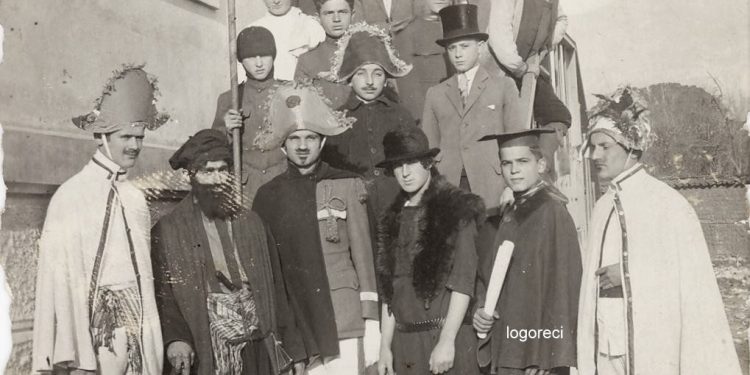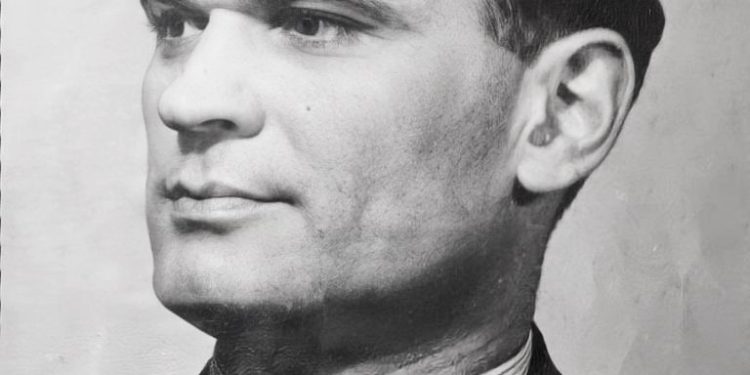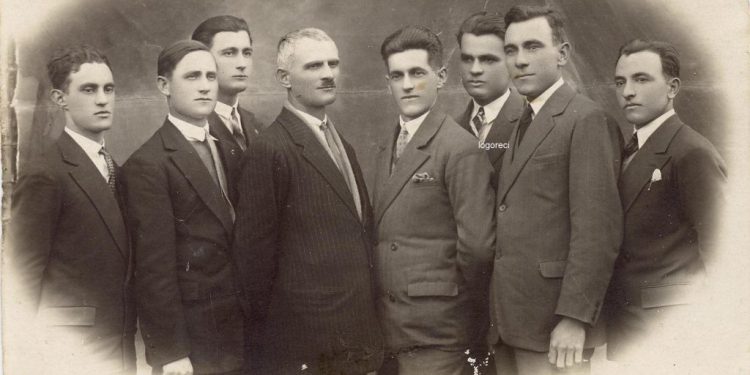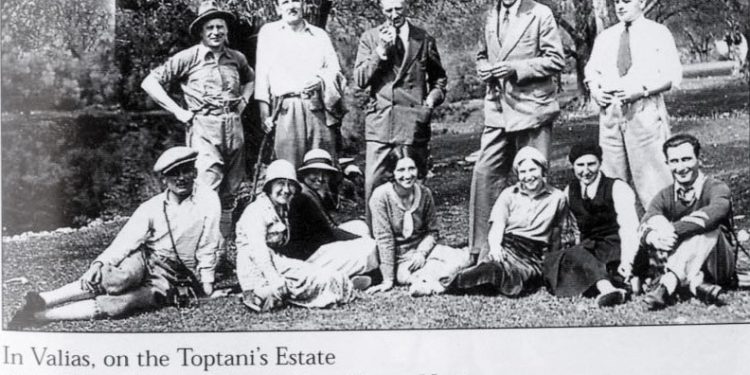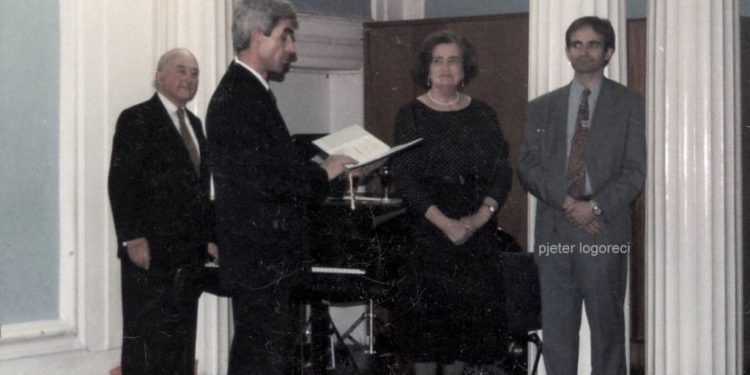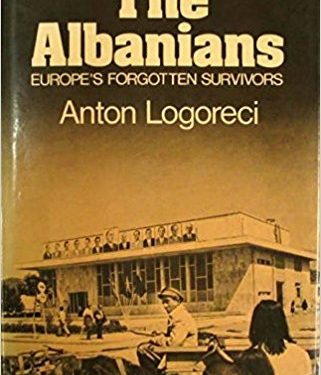By Pjeter Logoreci
Memorie.al / A profile for Anton Logoreci, writer, journalist, diplomat and incomparable patriot in the service of the nation…! After the communists came to power, as a result of the comments and criticisms that he conveyed through Radio London, his family in Shkodër suffered the ordeal of torture, prisons and discrimination…! “Decades of dictatorship denied our national culture, a very powerful active mission, that of the diaspora. A valuable element of this cultural space, which is waiting to be affirmed as soon as possible to the national culture and to be realized as soon as possible, in the popular consciousness, especially in that of the youth, is the spiritual heritage of Anton Logoreci. This powerful personality of our culture belongs to that generation of Albanian intellectuals who understood the national damage of communism and opposed it with all their intellectual ability, spiritual will and fire of passion”!
I started my writing on the intellectual and patriot Anton Logoreci, with this very significant passage from an article published in the Albanian press by the well-known Shkodran researcher Anton Çefa, entitled: Anton Logoreci, worthy representative of the culture of the Albanian diaspora.
The intellectual Anton Logoreci or Ndoci, as the people of Shkodra called him, was born in Shkodra on July 19, 1910, in a family with patriotic traditions. Mother Maria, daughter of the elite Toska family, had nine children, seven sons and two daughters, among whom Antoni was the first child. His father, Pjetri, worked as a jeweler to feed the large family, but he was also very active in the political and social movements of the time.
For this reason, during his government, Noli appointed him sub-prefect of Malësia e Madhe, while his brothers, Matia and Paloka, had responded to the call of their uncle, the Archbishop of Skopje, Andrea Logoreci, to work as a teacher for the spread of Albanian language education in Kosovo (Prizren and Gjakovë).
As a child, Antoni had contact with major figures of our national renaissance, such as; Filip Shiroka, Luigj Gurakuqi, Gjergj Fishta, Ndre and Lazer Mjeda, who were friends of the family, but also relatives (Ndre and Lazer Mjeda) of the Logorecs. He began his studies in the primary classes of the Franciscan Fathers, and later moved to the adult classes of the Jesuit College in the city of Shkodra. As a child, Antoni was always active and promised a prominent artistic and literary personality. He was an honor among talented children, part of the school’s theater group, where he managed to reveal his desire and passion for the stage among the roles of historical and patriotic melodramas that were played in college.
In a biographical note about Logorec, Mr. Fan Sotir Kristo, the well-known Albanian-American from Boston, writes in volume 12 of the Albanian Catholic Bulletin, published in San Francisco as well as in the American news network ‘FROSINA’, these memories: “… My wife Jane and I were lucky, many years before, to meet Anton Logoreci in London, during our visits to that historic city, where we quickly became good friends with him and his beautiful wife, Doreen, whom he met at the BBC, where they worked together during World War II.
Anton Logoreci,… was the last treasure given to the world by an Albanian Catholic family. Relatives of his family were the Archbishop of Skopje Andrea Logoreci, Mother Teresa’s parents, Mati Logoreci, his uncle who worked hard to preserve the Albanian culture in Kosovo and to help formulate a common alphabet for the Albanian language. During his childhood, Antoni attended the Franciscan primary school in Shkodër, where he served at the altar of Saint Anthony’s Church, nearby. As a child, he regularly served the Mass of Father Gjergj Fishta, the great Albanian author and poet laureate”.
In 1922, with the establishment by the American Red Cross of the American Technical College in Tirana, the family sent Anton to this college, which greatly influenced his western education. The environment, the English language, the curriculum, the numerous activities, as well as the teachers and specialists of the school, were powerful elements in the many-sided educational and disciplinary preparation of each student, which would later serve to create the foundations of a career powerful.
In addition to preparing a caste of technicians, who would later serve the reconstruction of the country in all fields, the College was one of the powerful bases for the creation of progressive elements, who, with the culture acquired there, showed the world that they came from an emancipated and decent European society.
Antoni, with his literary talent, became one of the chosen students of director Harry Fultz, who led the editorial board of the school magazine ‘LABOREMUS’, which he had created himself. Antoni was an honor to the editors of the magazine, but also very active with his writings in this organ. Thanks to his intelligence, this period served him to understand the secrets of prose writing, which then helped him for his permanent job at Radio London, but also to write successful articles, stories, novels and books.
After graduating in 1927, Anton was given the opportunity to be the companion and translator of the British general, Jocelyn Percy, whom President Zog charged with the organization and training of the Albanian Gendarmerie. Working in the English general’s team, I help Logorec to create a correct perspective on democracy, diplomacy, and politics and also to determine the path of his future studies and career.
After receiving a scholarship, for high results, from the state, in 1937, I began my studies and graduated in economics and political science at the state university in London, LSE (London School of Economics and Political Science), one of the most famous universities of the world, from which came world political personalities, many Nobel Prize winners, entrepreneurs from the most successful in the world, famous journalists as well as dozens of professors, who then taught in all parts of the globe.
In Albania, Antoni, although at a young age, managed to create numerous connections with prominent personalities of the time from all fields, such as; Edith Durham, Ernest Koliqi, Branko Merxhani, Ismet Toto, Tajar Zavalani, Eqerem Çabej, Karl Gurakuqi, Petro Marko, Odise Paskali, etc. He had a permanent collaboration, through his publications, with the Albanian magazines and newspapers of the time. ‘NOLOGUS’ was the pseudonym by which he appeared with his writings in the press, both at home and abroad.
In 1940, the British government, assessing the international situation, decided to open a program in the Albanian language on the well-known BBC network. This information window would serve the Albanians, who suffered under the fascist occupation, to understand the war situation, but also to raise awareness against the occupier. With the proposal of the secretary of the Albanian embassy, Dervish Duma, the direction of this program was taken by Anton Logoreci. Duma knew Logoreci well, since Fultz’s school; they were close friends and collaborators, for the good of Albania, all their lives.
There is no Albanian who has not heard the voice of Anton Logoreci every evening, from the broadcasting center of the BBC, which was an institution of political and democratic education for him as well. He did not work there as a simple speaker, but also as a commentator, as the head of the sector for Albania, and later as the head of the BBC for the entire Eastern Europe sector”, writes Albulena Stojaku, in the Albanian press in the article: NOLOGUS, A FORGOTTEN PERSONALITY…’, dedicated to Anton Logoreci…!
“He was one of the most qualified commentators on Eastern Europe and later became a writer and journalist for the Central Europe program and remained a valuable commentator for the BBC for years, specializing in human rights issues man in Eastern Europe, as well as the developments in Albania.
Logoreci was the only reason for the attention that Albania received after the war. From the beginning, he accuses Enver Hoxha of his dictatorship, stressing that the future of Albania should belong to Western democracy and not communism. Logoreci, was a defender of the autonomy, culture and traditions of Kosovo. His comments were far-sighted and often prophetic”, says the expert on the Albanian issue, his Albanian-American colleague and friend Fan Kristo, in the “Catholic Bulletin” of the Albanians of California.
Anton Logoreci was known throughout the Albanian diaspora, not only as a result of the spread of his voice and comments in Albanian by Radio London, but also from his publications, as a writer and journalist. It was his life’s desire to dedicate him to this field. His prose creations were permeated by a flexible and modern style, which set him apart from other contemporary writers. In his passionate writings, he masterfully brought before the readers, the beauty of the Albanian lands, the freshness of the flowers in the Shkodra courtyards, the characters of his fellow citizens with their social problems, and his burning longing for his homeland.
With the arrival of the communists in power, as a result of the comments and criticisms that Logorec conveyed through Radio London, his family in Shkodër suffered the ordeal of torture, prisons and discrimination. The regime imprisoned his younger brother, just out of high school, Filip, who suffered, locked up but not punished, in Shkodra prison where his limbs were amputated, where he fell seriously ill with tuberculosis which caused his death in sanatorium.
His fellow prisoners show that: every time the dictator’s name was mentioned in the Albanian program of Radio London, the ignorant samples, the communist captains of the prison, mercilessly tortured brother Filip until he was about to die. Antoni’s family in Shkodër was constantly raided and checked by the Security units, who sought to find a reason to imprison the other brothers. Thanks to Antoni’s personality, acquaintances and good contacts, the Logorecs had a short period of “calm”.
In the memory of every member of the Logoreci family, they were taken under protection, during a reprisal, by the writer Petro Marko, who, with the status of commander, was on duty in Shkodër, who, I just heard that in Anton’s family Logoreci, were being raided, and the members of the family had handcuffed him, personally intervened, removing the Security unit from their house and preventing the imprisonment of Gaspri, Antoni’s other brother, who remained in prison for only a few days.
Likewise, they cannot forget the confession of the communist (member of the Central Committee) Fadil Paçrami, about his meeting with Anton in London. According to Paçram:…He was sent to London by the dictator, to ask Anton to “return” to Albania,…with the reasoning:…that Albania “needs” you more than London…!
Logoreci, who knew better than anyone else the exploits and infidelity of the Albanian communists, did not accept, as he was convinced that if he returned, he would be shot or imprisoned for life. As a human rights activist, in international forums, he contacted and received information from all the Albanian political fugitives who came to the West, for this reason, he was always well informed and current in his broadcasts on Radio London.
He also knew very well the revenge of the criminal Mehmet Shehu, who had been a classmate at Fultz’s American college. Everyone knew that Mehmet Shehu arrested, imprisoned or shot almost all of his American school colleagues, for the sole “guilt” of being students of the “spy” Harry Fultz…!
During the years of his professional training, as well as his commitments for Albania, Antoni had close cooperation with personalities of Albanian culture in the diaspora, such as: Dom Zef Shestani, Arshi Pipa, Martin Camaj, Zef Skiroi, Father Daniel Gjeçaj, and Ernest Colic…! In his house in London, for years, Logoreci, hosted and sheltered many fugitive compatriots and students from Albania, who were waiting to travel to the free world, America and other countries.
In 1977, Anton Logoreci published his book in London; “The Albanians – Europe’s Forgotten Survivors” (or written in Albanian “Albanians – forgotten survivors of Europe”), a professionally written book that became a point of reference for all researchers of the Albanian and Balkan issue. The book was an in-depth analysis of the causes of the long languishing of the homeland from communism, isolation, international conflicts, relations with neighbors, as well as the suffering and perspective of the freedom of the martyred Kosovo.
The English journalist and critic, Elisabeth Barker, writes: …Logorec gave his book, “The Albanians”, a meaningful title – Europe’s Forgotten Survivors” – THE FORGOTTEN SURVIVORS OF EUROPE. He has told in the book the story of one of the smallest and oldest European nations, who live in their rocky mountains, on the eastern coast of the Adriatic, a people always attacked, but never subdued by foreign invaders. , surrounded by hostile neighbors, and for most of its history, forgotten by the world.
Likewise, the journalist of international politics and the well-known specialist of the Balkans, James H. Seroka, have evaluated the book with these words: … an interesting and correct description of contemporary Albania, which contains descriptions from history, culture, economy, politics, sociology and politics of the country, but unlike other books, this one is written by an Albanian with a perspective…!
The book is the single best source, for Albania, printed until today…! It is a pity, writes Prof. Anton Çefa, that the tragedy still continues. The book has been written and published, but it has not yet fallen into the hands of Albanians, it has not been translated, so it has not been read.
Although with a fulfilled life and family, Antoni, who had been gone for decades, unable to visit the country of his birth, was burning with longing for his homeland. This was clearly reflected in his sketches and stories about the homeland and especially about Shkodra. He was almost every year, accompanied by a member of his friendly family, Kovaçi from Ulcinj, climbing to a high point of the mountain of Tarabosh, to face his beloved Shkodra, but extinguished the longing for the place of his birth and the other half of the family, which was writhing in the Albanian communist hell.
Whenever from Taraboshi, he took with him and clutched to his chest, a handful of stones from his mother’s land, Albania.
Antoni died on September 23, 1990, without being able to return to his homeland and his hometown of Shkodër, but he managed to see the agony and fall of the communist beast, both in his homeland and in all of Eastern Europe, which is what I have been working for all my life. . For his political and patriotic activity, in 1993, the president of Albania, Dr. Prof. Sali Berisha, honored him with the “Torch of Democracy” medal.
For about 12 years, the Municipality of Shkodra has neglected to give an honorary title or the naming of a street to perpetuate the name of Anton Logoreci, who, with his activity in London, did honor to the nation and the city of Shkodra. But the malice and ignorance of the leaders of the local administration will not be able to fade the greatness of Anton Logoreci, the son of a family, a strong stone in the foundations of the history of the city and the Albanian nation. Memorie.al
Vien, on 10.5.2017




